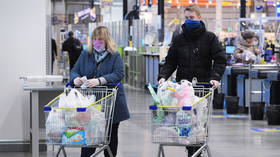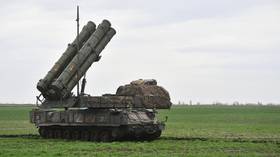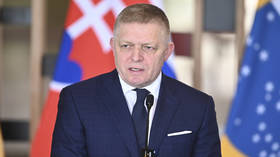‘I told you a crisis was coming!’ There’s nothing more relaxing for a Russian than a pandemic-induced disaster

My usually morose father, born and brought up in the Soviet Union, is the jolliest he’s been in years. It’s not schadenfreude, honest — we Russians just love being vindicated over our obsession with preparing for the worst.
To be clear, my father is not a sadist.
Like virtually everyone else, he’s very sympathetic to anyone who’s been hospitalized and healthcare workers, concerned for his own health (he’s 63), and financially impacted by all of this. But he was also in the best mood I’d ever seen him, actually laughing on the phone as he delivered potatoes and pelmeni in what I humorously referred to as the first round of the Russian crisis care package (the next is a baseball bat, followed by an air rifle).
My Russian friend and I joked that it was because his Soviet persecution complex had finally been vindicated.
“We all laughed at your dad when he installed a security camera INSIDE the living room,” she said. “But he’ll be the most prepared when the looters arrive looking for toilet paper. The soundproof basement he built is basically already a panic room, and he can easily convert the garage into a bomb shelter.”
As I looked around, I couldn’t help but notice that both I and all of my other Russian friends seemed to be — in many ways — the most relaxed we’d been in forever.
“It’s because we were prepared,” another Russian friend said. “My mother has been living in the wilderness and going to bed with a chainsaw since I was born. Now the fact that she’s been growing her own vegetables for years is really paying off. She’s even making her own face masks for hospitals with her homemade sewing kit.”
There’s a darkness to all of these jokes that we all understand without having to say it out loud. Most Russian Americans my age — 31 — were raised in relative privilege but grew up hearing the horror stories of World War II, the terror of Stalinism, the ache of not being able to feed your family in the early ‘90s.
“It’s all going to be OK,” my father said, when I complained that there was no chicken left in Whole Foods. “We’ve dealt with long lines and empty shelves before.”
In many ways, for us, it feels like we’re finally living out the nightmare our parents had always warned us about. People keep saying the coronavirus crisis is a war, and it certainly feels like one, even though it’s obviously not the same. Still, I feel a weird connection to my ancestors as I make another buckwheat dinner and wash my clothes by hand while singing Russian folk songs. I know the army motto: stay busy, stay positive, make jokes, and remember we’re all in it together. And don’t feel guilty about breaking out that pack of emergency cigarettes.
Also on rt.com Organizers want Russian WWII veterans who defeated Hitler to STAY AWAY from Victory Day parade over Covid-19 fearsThere’s obviously a psychological element to all of this, given that — on a cultural level — Russians seem particularly prone to anxiety, and for good reason. We were all raised by people who were raised by people who had legitimate reasons to worry about making it out alive by nightfall, and anxiety is genetic. As experts will tell you, people who have generalized anxiety disorder often feel more calm in the event of an actual crisis. The invisible thing that you’ve been panicking over and silently dreading has finally happened, so now you can relax. And there’s a sense of solidarity in knowing that everyone is now waking up with the same feeling of existential panic that you experience on any given day.
I feel a surge of love every time I see videos on social media of how Russians are handling the quarantine. There’s one in particular that resonates with me: a babushka casually drinking vodka on a balcony with her next door neighbor in the middle of a snowstorm, set to the soundtrack of Sluzhebniy Roman (Soviet comedy).
Quarantine, Russian-style. pic.twitter.com/BzM5FrNwbj
— Tom Parfitt (@parfitt_tom) March 31, 2020
Yes, I know it’s every Russian stereotype rolled into one, but it also exhibits what I love most about my culture: our resourcefulness, our ability to make the best out of bad situation, how we find ways to connect even if we have to stay apart, how we achieve victory over despair with humor, and the poetry that we see in loss.
Think your friends would be interested? Share this story!
The statements, views and opinions expressed in this column are solely those of the author and do not necessarily represent those of RT.














